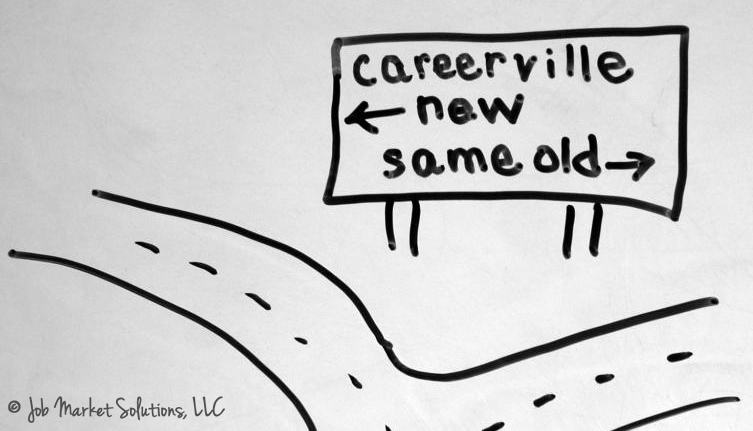If you’re unhappy with your job, maybe a new job isn’t the answer.
Maybe a new kind of job is what you really want, a change of career. People change careers for all kinds of reasons and at different stages of their lives.
More than half of all American workers want to change careers, so if you are thinking along these lines, you’re in the majority. The first step in deciding if a career shift is a good idea is to examine your reasons for wanting to change direction.
Signs That a You’re Ready for a Switch
How many of these telltale signs are familiar to you?
Your present work leaves you feeling depleted, stressed, or exhausted on a regular basis and you don’t see any job descriptions in your company or field that would change that.
You never aspired to the job you have, never dreamed of it as a young person or set it as an adult goal.
Your most outstanding skills are seldom or never used in your present position and your industry doesn’t consider them important.
You’re usually bored during working hours, dread going to work, and count the hours to your next day off.
You haven’t made friends with many co-workers or bonded with colleagues because you don’t share enough interests.
Your company represents an industry or profession that doesn’t support your personal values.
You’re part of an industry that is declining.
Steps You Can Take Now
Seldom does a career change go seamlessly. But with some careful planning, you’ll smooth and shorten the transition. To that end, I’m listing the best tips I’ve gleaned from crafting resumes and from working with career coaches and human resource professionals.
Don’t just daydream about the perfect job. Do your homework to see if your dream job really exists, and what it would take for you to qualify. Determine if you’re willing and able to get the training or accreditation you’ll need.
Look at the industries that are growing (like healthcare, utilities, technology and science, data processing and hosting services, tourism and hospitality, and web design), then investigate the positions within them to see where you might fit in.
Make a list of your transferable skills and then research how those skills could be used in the industries where you’d rather be working.
Ask yourself, “What is it that I truly want out of my career? What is it about my current work that makes me want a different career?” The answers will help you make better choices about changing your career path.
Consider whether you can transfer to a different role within your present company, such as switching from data processing to sales, or from customer service to digital marketing.
Get career counseling. It doesn’t make sense to go it alone. Why guess at what you need to do when private agencies, life coaches, alum associations and government help is available?
Calculate what you need for income both in the future and during the career transition when you might have to take a salary reduction.
Test your own personality to determine the kind of career that fits you best.
Lean on your network, which can help you make informed decisions. Your friends, business associates, and colleagues can supply valuable guidance and give you added confidence.
Time your career shift well. It may make sense to train for a new career before abandoning your present one. Meanwhile, study at home or attend classes.
Join groups on social media that focus on your skills, interests and hobbies. You never know when one connection can lead you to a new opportunity, so become an active participant instead of a lurker there. You’ll also expand your working knowledge of your chosen field.
On LinkedIn, use the “People who used to work at” feature to locate people who have worked your dream job and read their work history to learn how they arrived there. These people might also become your contacts or mentors.
Doing freelance or volunteer work in an industry you’re considering will give you connections and experience. Informational interviews are another way to test the waters and extend your network.
Join any industry associations you’re qualified to be part of, and attend industry events like conventions, symposiums and trade shows, to meet people and get in the information loop.
When You’re Ready to Move On
Be brave and focus on your long range career goals. Don’t let minor setbacks discourage you or your present job drag you down.
The skills we want to emphasize on your new resume will be leadership, flexibility, communication, intelligence, passion, and the willingness to work hard. So, keep track of accomplishments that showcase these skills.
Choosing the right career field is important. Everyone deserves to work where he is valued and is happy. If your present career doesn’t jive with your values, your personality, your goals and your skills, you’re likely to feel your real life is on hold.
Don’t stay in a toxic job because you are afraid to switch paths. If you make decisions based on a realistic look at your motives and capabilities you’re likely to find that job you love.
